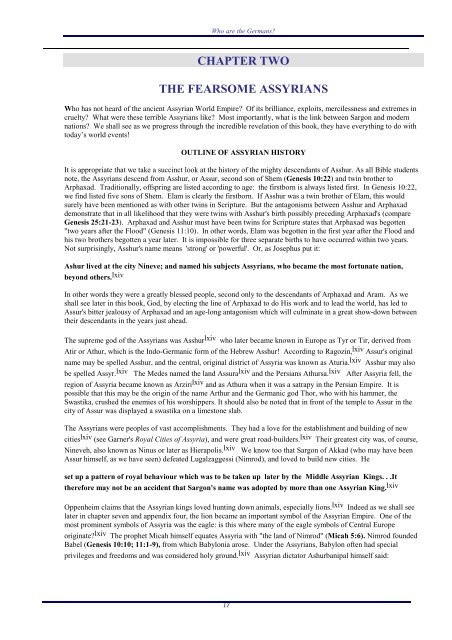WHO ARE THE GERMANS - Churches of God Cyber Auxiliary
WHO ARE THE GERMANS - Churches of God Cyber Auxiliary
WHO ARE THE GERMANS - Churches of God Cyber Auxiliary
You also want an ePaper? Increase the reach of your titles
YUMPU automatically turns print PDFs into web optimized ePapers that Google loves.
Who are the Germans?<br />
CHAPTER TWO<br />
<strong>THE</strong> FEARSOME ASSYRIANS<br />
Who has not heard <strong>of</strong> the ancient Assyrian World Empire? Of its brilliance, exploits, mercilessness and extremes in<br />
cruelty? What were these terrible Assyrians like? Most importantly, what is the link between Sargon and modern<br />
nations? We shall see as we progress through the incredible revelation <strong>of</strong> this book, they have everything to do with<br />
today’s world events!<br />
OUTLINE OF ASSYRIAN HISTORY<br />
It is appropriate that we take a succinct look at the history <strong>of</strong> the mighty descendants <strong>of</strong> Asshur. As all Bible students<br />
note, the Assyrians descend from Asshur, or Assur, second son <strong>of</strong> Shem (Genesis 10:22) and twin brother to<br />
Arphaxad. Traditionally, <strong>of</strong>fspring are listed according to age: the firstborn is always listed first. In Genesis 10:22,<br />
we find listed five sons <strong>of</strong> Shem. Elam is clearly the firstborn. If Asshur was a twin brother <strong>of</strong> Elam, this would<br />
surely have been mentioned as with other twins in Scripture. But the antagonisms between Asshur and Arphaxad<br />
demonstrate that in all likelihood that they were twins with Asshur's birth possibly preceding Arphaxad's (compare<br />
Genesis 25:21-23). Arphaxad and Asshur must have been twins for Scripture states that Arphaxad was begotten<br />
"two years after the Flood" (Genesis 11:10). In other words, Elam was begotten in the first year after the Flood and<br />
his two brothers begotten a year later. It is impossible for three separate births to have occurred within two years.<br />
Not surprisingly, Asshur's name means 'strong' or 'powerful'. Or, as Josephus put it:<br />
Ashur lived at the city Nineve; and named his subjects Assyrians, who became the most fortunate nation,<br />
beyond others. lxiv<br />
In other words they were a greatly blessed people, second only to the descendants <strong>of</strong> Arphaxad and Aram. As we<br />
shall see later in this book, <strong>God</strong>, by electing the line <strong>of</strong> Arphaxad to do His work and to lead the world, has led to<br />
Assur's bitter jealousy <strong>of</strong> Arphaxad and an age-long antagonism which will culminate in a great show-down between<br />
their descendants in the years just ahead.<br />
The supreme god <strong>of</strong> the Assyrians was Asshurlxiv who later became known in Europe as Tyr or Tir, derived from<br />
Atir or Athur, which is the Indo-Germanic form <strong>of</strong> the Hebrew Asshur! According to Ragozin, lxiv Assur's original<br />
name may be spelled Asshur, and the central, original district <strong>of</strong> Assyria was known as Aturia. lxiv Asshur may also<br />
be spelled Assyr. lxiv The Medes named the land Assuralxiv and the Persians Athursa. lxiv After Assyria fell, the<br />
region <strong>of</strong> Assyria became known as Arzirilxiv and as Athura when it was a satrapy in the Persian Empire. It is<br />
possible that this may be the origin <strong>of</strong> the name Arthur and the Germanic god Thor, who with his hammer, the<br />
Swastika, crushed the enemies <strong>of</strong> his worshippers. It should also be noted that in front <strong>of</strong> the temple to Assur in the<br />
city <strong>of</strong> Assur was displayed a swastika on a limestone slab.<br />
The Assyrians were peoples <strong>of</strong> vast accomplishments. They had a love for the establishment and building <strong>of</strong> new<br />
citieslxiv (see Garner's Royal Cities <strong>of</strong> Assyria), and were great road-builders. lxiv Their greatest city was, <strong>of</strong> course,<br />
Nineveh, also known as Ninus or later as Hierapolis. lxiv We know too that Sargon <strong>of</strong> Akkad (who may have been<br />
Assur himself, as we have seen) defeated Lugalzaggessi (Nimrod), and loved to build new cities. He<br />
set up a pattern <strong>of</strong> royal behaviour which was to be taken up later by the Middle Assyrian Kings. . .It<br />
therefore may not be an accident that Sargon's name was adopted by more than one Assyrian King. lxiv<br />
Oppenheim claims that the Assyrian kings loved hunting down animals, especially lions. lxiv Indeed as we shall see<br />
later in chapter seven and appendix four, the lion became an important symbol <strong>of</strong> the Assyrian Empire. One <strong>of</strong> the<br />
most prominent symbols <strong>of</strong> Assyria was the eagle: is this where many <strong>of</strong> the eagle symbols <strong>of</strong> Central Europe<br />
originate? lxiv The prophet Micah himself equates Assyria with "the land <strong>of</strong> Nimrod" (Micah 5:6). Nimrod founded<br />
Babel (Genesis 10:10; 11:1-9), from which Babylonia arose. Under the Assyrians, Babylon <strong>of</strong>ten had special<br />
privileges and freedoms and was considered holy ground. lxiv Assyrian dictator Ashurbanipal himself said:<br />
17


